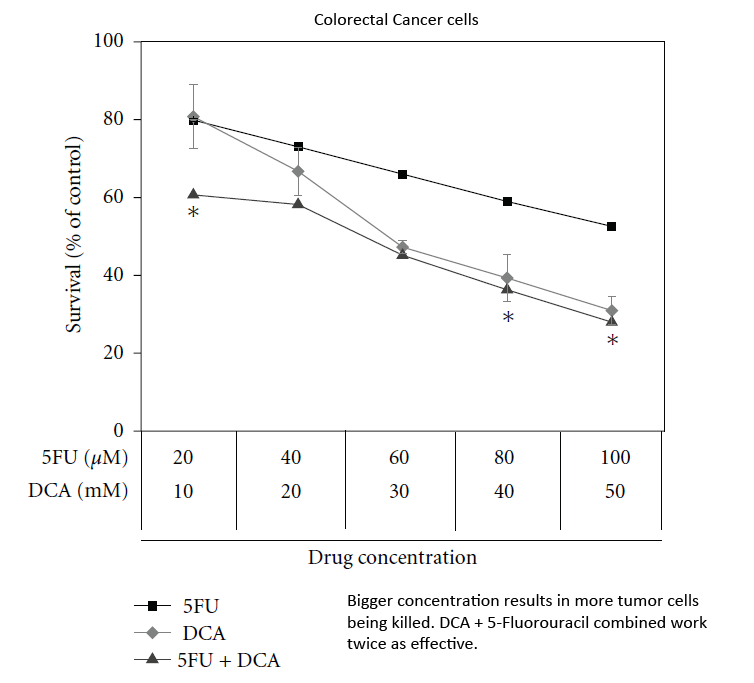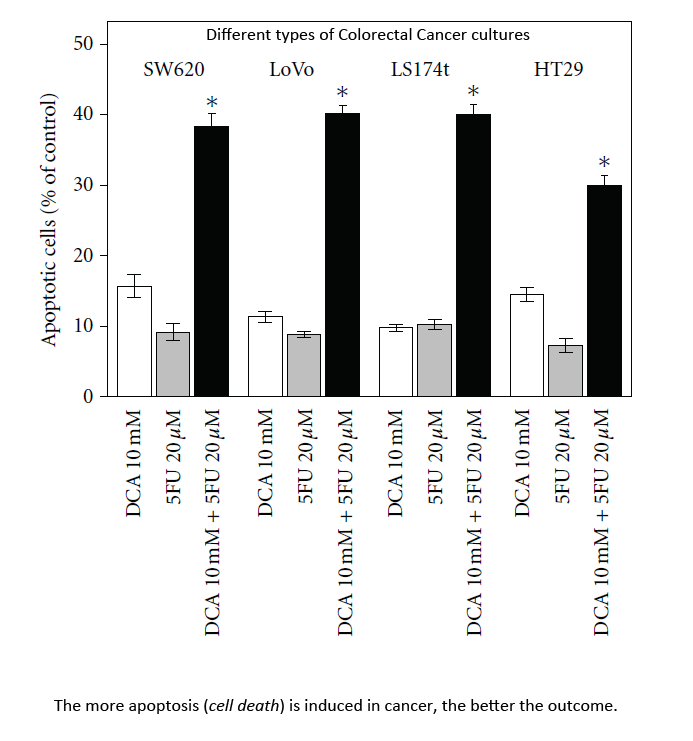
CRC without doubt is one of the most common cancers in the world. Luckily, if caught early – it is often curable by surgery. Later stages of Colorectal cancer become more dependent on chemotherapy treatment.
Usually chemo drugs are not used alone, it is preferred to combine two or more medications simultaneously. This way the treatment is more effective and the patient experiences less toxicity when dealing with cancer.
As far as we know, DCA is able to provide an outstanding effect against certain malignancies while causing little to none adverse reactions. Unsurprisingly, it can be used simultaneously with other antitumor prescriptions to provide a better outcome for someone who is suffering from cancer.
Apparently, a team of researchers felt enthusiastic about using DCA with the most popular medication and decided to give it a shot against Colorectal Cancer. Soon they came to a few conclusions.
It appears that the combination of Dichloroacetate and 5-Fluorouracil hasa synergistic antitumor effect. The duet has the potential to eliminate larger masses of Colorectal Cancer cells when used simultaneously. It is also possible that this new way of treatment can be more health-preserving and less toxic because of the lower doses required to achieve desirable therapeutic effects.

First of all, let us briefly remember some facts about 5-Fluorouracil. For decades, it has been a classic choice for treating gastrointestinal tumors (including Colorectal Cancer) as well as other malignancies. Anyone who is diagnosed with progressed CRC will most likely receive 5-FU as chemotherapy.
However, the problem is that it seems to be quite difficult to choose the adequate dosing and the right scheduling to achieve maximum results while avoiding unpleasant side effects. 5-Fluorouracil is known to be one of the few drugs which have dramatic toxicity shifts depending on the quantity.
The medication is not without flaws, the drug may cause major toxicity to the bone marrow and provoke myelosuppression which can end up in weakness as well as impaired immune system. Other minor side effects include classical adverse reactions which are often experienced with most of chemotherapy (etc. mucositis, nausea and so forth).
Naturally, all of this motivates us to find out ways to avoid such grim outcomes while preserving the healing effect. Currently combination therapy with 5-FU is used widely in the hope of finding relatively safe and effective regimens.

By this time, most of us have probably heard about DCA and what it does. With the help of dichloroacetate we can attempt to restore the mitochondrial function, reverse the Warburg effect and promote natural programmed cell-death (apoptosis) in malignant cancer cells.
The substance is not only relatively cheap, selectively targets cancer cells, does not harm healthy organs and proves to be quite effective. Taking all of this into consideration, DCA appears to be a fine candidate, which could help those who are fighting colon cancer.
With this in mind, recently a handful of scientists from the Third Military Medical university decided to examine the possible outcome of DCA and 5-Fluorouracil combination on Colorectal cancer. After a series of experiments they presented their findings. The results were impressive.
It was proven that dichloroacetate not only leads to natural cell death in CRC cells, it also enhances the clinical activity of 5-Fluorouracil serving as a great, potential synergistic component in combination therapy. This means that DCA can be used with the majority of conventional colorectal cancer treatment options.

On the whole, a couple of things seem clear – it is difficult to accurately predict how new ways of antitumor treatment could affect patients suffering from cancer. Nevertheless, we know that DCA does not provoke any significant health issues. Bearing this in mind, it is safe to claim that when dealing with CRC, dichloroacetate could provide benefits.
It’s great to know that the results of DCA + 5-FU treatment in vitro appear to show splendid outcome on CRC cultures. However, we must be aware that the original 5-Fluorouracil treatment should not be totally replaced as it can be supported with the synergism of dichloroacetate.
Finally, who knows? Maybe this will become the more safe, the more effective way to approach Colorectal cancer?
If you’re interested in the study, please find out more below:
Synergistic Antitumor Effect of Dichloroacetate in Combination with 5-Fluorouracil in Colorectal Cancer